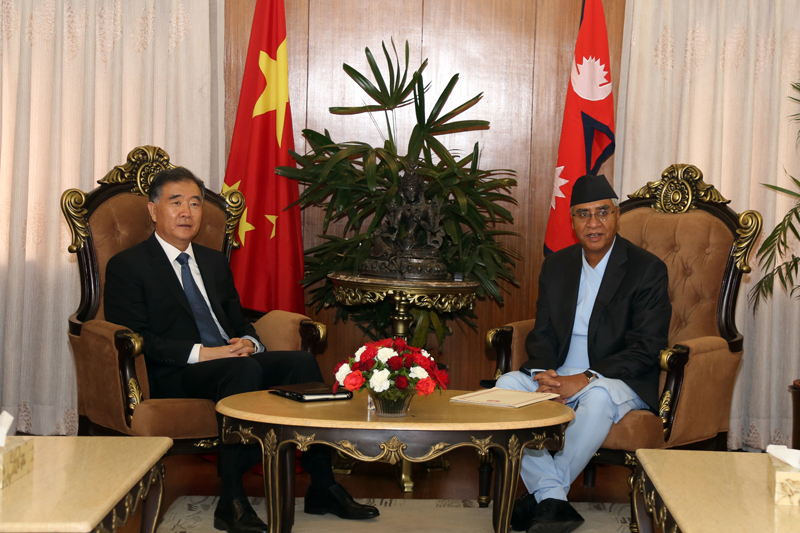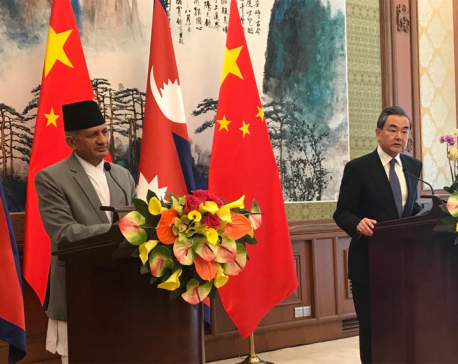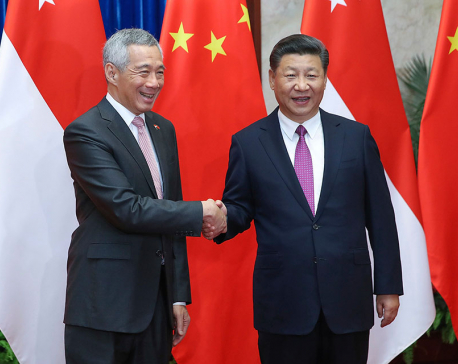
OR
BEYOND BORDERS


Biswas Baral
Biswas Baral has been associated with Republica national daily as a journalist since 2011. He oversees the op-ed pages of Republica and writes and reports on Nepal's foreign affairs. He is a regular contributor to The Wire (India).biswas.baral@myrepublica.com
More from Author
We should have sought to improve ties with China from a position of strength, not gone to Beijing with begging bowl when India decided to tighten the screws.
You can work around geography, but you cannot defeat it, Robert Kaplan famously argued in his 2012 bestseller The Revenge of Geography. The way he sees it, due to their geographic proximity, Nepal and India are fated to interact more, in good ways and bad, than Nepal and China ever will. This is exactly what the Indian strategists in New Delhi were reminding Prime Minister Sher Bahadur Deuba, with emphasis on favorable India-Nepal outcomes, during his recent India visit. I agree with them.
No matter how close Nepal and China get, our level of interaction, defined by cooperation or conflict, can never match extensive, geography-based Indo-Nepal relations. But is there really no way Nepal can overcome the compulsions of its geography?
According to Kaplan, even though geographical factors invariably prevail in the long run, in the short and medium terms, it is the level of leadership of individual countries that may be more important. Think of how Lee Kuan Yew was able to successfully transform a small enterpot on the Malayan peninsula into a global trading and logistical hub, or how our own BP Koirala, thanks to his political and intellectual genius, could gain the confidence of both India and China, something which no other political leader after him has managed.
Having a Narendra Modi, who does not seem to have a foreign policy beyond demonizing China and Pakistan and using the political capital thus gained for electoral purposes, as India’s paramount leader does not help. Although the 2015-16 border blockade was couched in terms of the rights of Madhesi people, in reality, it was a case of bruised ego, as Modi felt slighted that he could not even go where he wanted in Nepal.
Therefore, in its analysis of the first three years of Modi’s foreign policy, Brookings India came to the conclusion that the foreign policy of this prime minister is primarily driven by domestic and personal calculations, more so than perhaps any other prime minister of independent India.
Thorny red rose
Modi’s Nepal policy, in fact his whole neighborhood policy, has been a mess. After witnessing Nepal slide progressively closer to China after the blockade, Modi seems to be in a mood for course-correction.
Having helped install the Deuba-Dahal coalition to remove the ‘pro-China’ Oli, New Delhi reckons this coalition is worth investing in, if only to keep Oli out of power—and hence the red carpet for Deuba in Delhi. But the Indian establishment must also have been quite shocked to learn how even its old partner in Deuba and Nepali Congress are these days not entirely free of Chinese influence.
I see nothing wrong with India’s concerns over Madhesis, in the interest of greater stability in border areas. But the way it has gone about it leaves a lot to be desired. New Delhi has always had a vise-like grip over Kathmandu. There was no need for it to use the ‘sledgehammer’ of the blockade to push for Madhesi rights—a strategy that has clearly backfired.
Post-blockade, Chinese presence in Nepal has drastically increased. China has overtaken India as the biggest foreign direct investor in Nepal. There are currently three airlines flying to Nepal from India; there are now six from China. As more Chinese money and men move south, the Chinese presence in Nepal has never been more visible, from Kathmandu’s Thamel to Pokhara’s Lakeside.
Recently, Kantipur daily reported on how the Chinese are teaching Mandarin to 40,000 school students in Nepal, in a clear long-term push to change the Nepali public opinion in its favor.
Chinese President Xi Jinping is expected to visit Nepal sometime in 2018, after he consolidates his position as the strongest leader in China since Mao. Before Xi’s visit, Nepal will identify new infrastructure projects that it wants China to finance.
I am not sure this forced bonhomie with China is a healthy development for Nepal. We should have sought to improve ties with China from a position of strength, not gone to Beijing with a begging bowl when India decided to tighten the screws. Bilateral relations are not something that can be cultivated overnight. They take time and energy to develop.
Balance, don’t tilt
Most China boosters in Nepal overlook China’s hegemonic relations with its geographically-close neighbors like Vietnam and Cambodia or even with some of our partner states in South Asia. In their glee of getting to smite India’s face, they overlook the old maxim that Nepal’s interest is served only by maintaining a well-calibrated distance from both India and China. Just as tilting too much towards India is dangerous, tilting too much towards China is not advisable. There has to be a point at which we have to say no to China as well.
Nepal has of late proposed the idea of trilateral cooperation with India and China. But, interestingly, the idea seems to have come to our foreign policy mandarins only when India had imposed yet another crippling blockade.
I believe there hasn’t been enough homework on the feasibility of the trilateral idea. As the peaceful resolution of the Doklam crisis hinted, both India and China realize that in order to achieve their ambitious economic goals they have no option but to cooperate. So as farfetched as the idea may sometime appear, given India’s traditional reluctance to let any third country into Nepal, there is some substance to it. But first India needs to be convinced that this is not another ‘China card’.
The idea of trilateral cooperation still in its infancy, PM Deuba’s India visit will do nothing to change the basic calculus of Nepal’s foreign policy. The foreign policy establishment in Nepal seems to think that it is in our national interest to emerge from India’s long shadow and, in a concomitant balancing act, to get closer and closer with China.
But Nepal needs to be careful. Yes, a tilt towards China may be justified considering how heavily we rely on India these days. Yet Nepal first needs to identify its foreign policy priorities.
What are the guiding principles of our relations with India and China? Do we have a long-term vision of how we want these relations to progress? How do we diversify our foreign policy beyond these two countries? These questions cannot be answered objectively with any kind of pro-India or pro-China bias but only through a hard-headed foreign policy based on well-defined goals.
biswasbaral@gmail.com
You May Like This

In China, foreign minister Gyawali dreams to travel in China by modern train
BEIJING, April 18: Nepal is a natural area for cooperation between China and India, the Chinese government’s top diplomat State... Read More...

China protests US Navy sailing near South China Sea claims
BEIJING, Oct 11: China is protesting the sailing of a U.S. Navy ship near its territorial claims in the South China... Read More...







Just In
- NRB to provide collateral-free loans to foreign employment seekers
- NEB to publish Grade 12 results next week
- Body handover begins; Relatives remain dissatisfied with insurance, compensation amount
- NC defers its plan to join Koshi govt
- NRB to review microfinance loan interest rate
- 134 dead in floods and landslides since onset of monsoon this year
- Mahakali Irrigation Project sees only 22 percent physical progress in 18 years
- Singapore now holds world's most powerful passport; Nepal stays at 98th











Leave A Comment